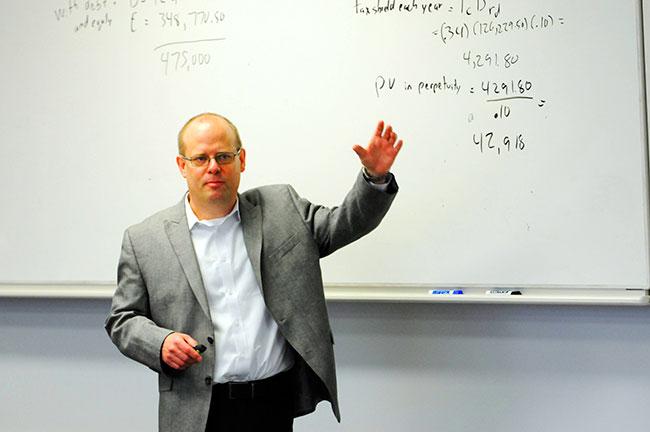New Morton Aldrich Professor explores the unconventional side of finance
Finance professor C. Edward “Ted” Fee studies the effects of corporate financial policy, but the recently appointed Morton Aldrich Professor of Business has been known to apply that lens to some offbeat subjects.

His PhD dissertation looked at how Hollywood motion pictures are financed, exploring the factors that lead producers to seek funding outside the studio system. He also wrote a paper that applied the concept of managerial tournaments to the NFL, investigating whether the prospect of promotion incentivizes assistant coaches in the same way it incentivizes managers within a corporation.
“When I do those kinds of projects, it’s more about using a unique setting to try to test an economic theory, almost in the Freakonomics vein,” explains Fee, who joined the Freeman School in 2014 and previously served as the Philip J. May Endowed Professor of Finance at Michigan State University. “For example, I think there are a lot of situations outside movies where financing and control rights come into play, so that was a way to use available data to illustrate some key points.”
Fee’s current research on mergers and acquisitions is similarly unconventional. Whereas most scholars have tended to focus on the firms involved, Fee looks at the bigger picture, investigating how mergers affect customers and suppliers as well.
“Mergers and acquisitions are one of the biggest decisions corporations can make, and they have huge impacts on everyone involved,” Fee says. “A lot of previous literature focused on what makes mergers succeed for the firms in the merger. I think what we did is take it a step further and ask how it affects not just the companies but the ecosystem they’re working in.”
A 1990 MBA graduate of the Freeman School, Fee spent four years in New York as a financial analyst and options trader before leaving to pursue a PhD in finance. After earning his PhD from the University of Florida, he joined Michigan State’s Eli Broad College of Business as an assistant professor of finance in 1999.
Since embarking on his academic career, Fee has won a number of awards for his research. Last year, he earned the prestigious Michael J. Brennan Best Paper Award from Review of Financial Studies for his research into how a manager’s personal characteristics affect the policies of his or her firm.
The paper was in response to a growing belief that the random personality traits of CEOs — such as being a risk-taker — play a significant role in determining corporate policy. While Fee doesn’t dispute that a manager’s personal style can influence his or her decisions, he dismisses the idea that corporate policies must then be based in large part on the random chance of their CEO’s personality.
“It’s a little more nuanced than that,” Fee says. “Boards think about these things ahead of time and try to optimally match the CEO to the kind of policies that work for their firm, so these random CEO characteristics aren’t really random. For example, the board may decide it needs someone with a greater appetite for risk because the old CEO was too cautious. ”
In addition to serving as Morton Aldrich Professor, Fee was also tapped to succeed Sheri Tice as finance area coordinator. In that role, he’s played a major role in the Freeman School’s faculty hiring initiative as well as the development of a new PhD program in finance and financial accounting.
“The Freeman School has always had a strong reputation in finance, and I think it will only grow stronger,” Fee says. “I couldn’t be happier to be here.”
Interested in advancing your education and/or career? Learn more about Freeman’s wide range of graduate and undergraduate programs. Find the right program for you.
Other Related Articles
- Politico: Trump administration moves closer to opening Venezuela to more US oil producers
- Alumna leverages Freeman network to land dream job at Entergy
- Alumna recalls trailblazing career in business, ministry
- Quartz: What it would take for Trump to drag Big Oil back into Venezuela
- Students network their way through Manhattan in annual Real Estate Trek
- DW News: Can the Fed stay independent under Trump?
- Snapping Back: Alumna is HP’s guardian against disruption
- Harvard Business Review: Why AI Boosts Creativity for Some Employees but Not Others
